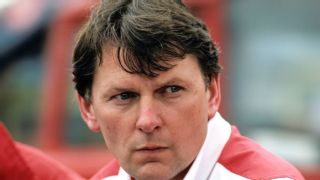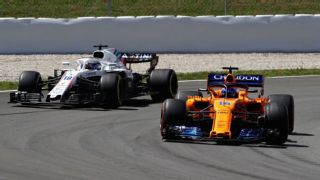|
Legendary McLaren and Ferrari designer John Barnard has been doing the media rounds of late, promoting his new book, The Perfect Car. ESPN interrupted his summer sojourn to France for an exclusive interview on the trials and tribulations currently affecting two of Formula One's most iconic names. McLaren has been the high-profile sob story of the season, and recent weeks have seen all manner of change at Woking, with the ousting of Eric Boullier and a restructure of the technical team. Barnard has not been shy of criticising his former employers, who were in a similar performance slump when he returned to the team in 1980. "My fear has always been that Formula One needed more pyramid structure of management," Barnard said, "not these sort of management systems used in big organisations, which I commonly referred to as matrix management. I just don't think that works in Formula One. "I think it started many years ago actually, long before Eric Boullier came into it. I think they've been lacking that technical leadership for some time. I don't know Eric Boullier so it's hard for me to say what his background and what his capabilities are, but he came from Renault as sporting director. He's not, to me, not the sort of person that can sit on top of the technical group. So, yes, I think I they've probably realised that they need to change that structure and they've started."  In Barnard's opinion, the F1 beast has now become so large that positive change is hard to effect. "You've got to have somebody that pulls all the different groups together. These days the teams are so big that you end up with groups of people working on different parts of the car and that includes the aerodynamics. "I've actually heard -- which I find hard to believe -- that you've got a group working on the front wing area, a group working on the rear wing area, another group on the cooling area. Somebody's got to pull those things together and make the compromises -- because there will be compromises from area to another -- and that person is what I would call the chief designer/technical Director. Without that person, I just don't think you can end up with one direction: you've got different groups and they'll all be saying, 'well it's not my bit, it's the other guy's bit'." The conversation moves on to sponsorship, performance, and the money needed to compete in Formula One. "When I was involved you got involved in everything, every technical aspect really. I think the fact is the teams have got so big now, they've become just huge operations. It's turning an oil tanker. I think providing McLaren's sponsors, their owners, are prepared to keep putting the money in while [the team] get it turned around, and providing they can find the right people, find some good people, then they'll turn around, they'll get it back on track. That may take some time. When I was in it one of the problems was that if you didn't perform you didn't get the sponsorship and so you kind of withered on the vine. "It's mega money now. The whole thing of lots of small partners, I know for a fact that one of Ron Dennis's original theories was 'I don't want lots of little stickers all over the car, I want one or two big spenders who can then have the car as they want'. So that was his theory, that was his approach. If they've gone the other way on that, I don't know whether that's a good idea or not. Whatever brings the money in is the best idea."  McLaren is not the only high-profile British team to find itself struggling in 2018. Williams, who had been riding a wave of success since its move to Mercedes power, is also sliding backwards on the performance scale. It is a situation that worries Barnard. "For me Williams are in a worse situation than McLaren because McLaren do have -- providing they're willing to stay on board -- their owners and we're talking about some serious Middle Eastern money, people who have enormous pockets. Whereas I'm not sure about Williams, I don't know what the ownership structure at Williams is anymore." We discuss Williams' shareholder structure and deputy team principal Claire Williams' recent comments welcoming F1's desire to introduce a cost cap in the sport, saying that a cap might be the only way to safeguard the Grove outfit's long-term future. "I suspect she's right," Barnard said. "These cost caps, I'd like to know how they're going to operate those. I remember talking about cutting the costs in 1990, '91, people were talking about what can we do to cut the costs then. "And everything that was suggested, you just felt well, if you're a big team or even a manufacturer, there's all sorts of ways around this. Development can be done back in factory on another project, then it's suddenly shipped over to Formula One, all these kinds of things. It's very difficult to control. I will wait with interest to see how they're going to do that."
|
